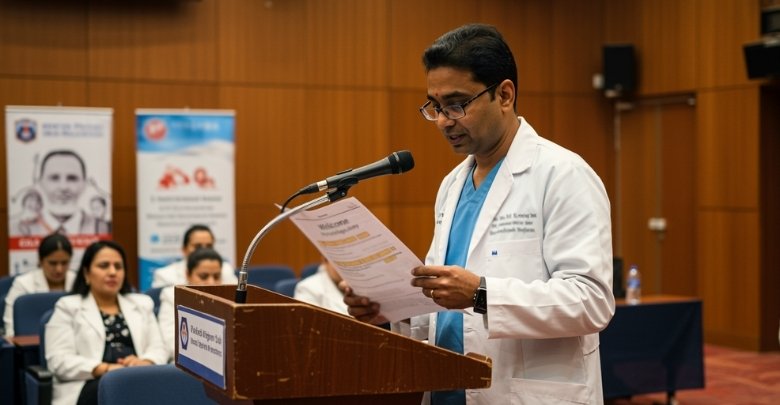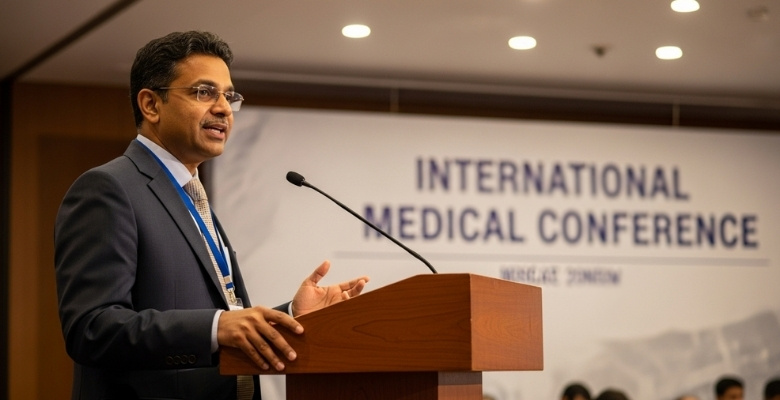Attendees are often greeted with a welcome speech at an event. It sets the mood, brings attention, and helps everyone settle into the room. You might already be thinking about how to write or deliver a good welcome speech at a medical conference.
A welcome speech at a medical conference should greet attendees, highlight the event’s purpose, and inspire collaboration. Use a formal, warm, or student-friendly tone to match your audience. Focus on shared goals in healthcare, learning, and professional growth.
If this is something you’ve been thinking about, you’re in the right place. This article covers every detail from speech length, tone, and structure to sample phrases and helpful tips. You’ll find everything you need to feel prepared and confident.
Welcome Speech at a Medical Conference
Starting a medical conference with the right words sets the tone for the entire event. A thoughtful welcome speech helps the audience feel appreciated, engaged, and ready to learn. Here are some conference welcome speech sample scripts you can adapt, depending on your audience and the type of event.
Formal Welcome Speech Examples for Medical Conferences
Good morning, distinguished guests, respected colleagues, and esteemed delegates.
My name is [Your Name], and it is my honor to welcome you to this year’s Medical Innovations Conference.
Your presence shows a shared commitment to better care and better outcomes. Over the next sessions, we will review …………………
Download the full version here
Warm and Engaging Welcome Speech Examples
Good morning everyone.
My name is [Your Name], and I am happy to welcome you to our annual medical conference. It is great to see professionals, researchers, and students together in one room. This event is more than a set of talks. It is a place to…………………
Download the full version here
Student-Friendly and Inclusive Welcome Speech Examples
Hello and welcome everyone.
My name is [Your Name], and I am glad to see doctors, nurses, students, researchers, and health leaders here today.
This conference is a place to learn, share, and grow. If you are new to events like this, you are in the right place. Please ask questions. Join panels. Visit posters. Your voice matters. No question is too basic, and no idea is too small.
We are all here for the …………………
Download the full version here
Inspirational and Vision-Driven Welcome Speech Examples
Good morning, esteemed doctors and health leaders.
My name is [Your Name], and it is a privilege to welcome you.
Your daily work changes lives. You treat, you teach, and you improve systems. Today gives us a rare pause. We can step back, reflect, and plan our next steps with care.
This conference is not only about the latest results. It is also about hope, courage, and clear purpose. Each session may…………………
Download the full version here
Collaborative and Peer-Centered Welcome Speech Examples
Welcome, colleagues and friends.
My name is [Your Name], and I am pleased to open this conference with peers who know the craft and the challenge of medicine.
This is a place for honest discussion and practical learning. We come from different hospitals, labs, and clinics, yet we face many …………………
Download the full version here
Future-Focused and Evidence-Based Welcome Speech Examples
Good morning to all our respected doctors and clinical experts.
My name is [Your Name], and I thank you for joining us at a time when science moves fast and patient needs are complex.
This conference looks ahead. We will review tools that can help in clinics and wards, from decision support and imaging to new care models and quality methods. We will also look …………………
Download the full version here
Step-by-Step Guide to Structure a Welcome Speech for a Medical Conference
Giving a welcome speech for a medical conference can be both thrilling and a little difficult to prepare. With the right steps, you can make it simple, clear, and meaningful. Keep reading to learn how.
Step 1: Recognize Your Audience
Before writing your speech, think about who will be in the audience. It could be doctors, students, researchers, or healthcare workers. Each group expects a different tone. For example, in nursing and healthcare management conferences in Canada, the crowd often includes both experts and learners. So, your speech should sound clear, respectful, and easy to understand.
Step 2: Start With a Greeting
Always begin with a warm greeting that feels natural. A simple “Good morning, everyone,” works better than anything too complicated. Mention the group as a whole, so nobody feels left out. A kind opening helps people focus and prepares them to listen.
Step 3: Share the Purpose
Right after greeting, explain why the conference is taking place. For example, when giving a welcome speech for a CME program, talk briefly about the theme, the main goals, or the reason people gathered. This gives meaning to the event and helps the audience see the bigger picture. Keeping it simple makes it clear to all.
Step 4: Appreciate the Guests
Take a moment to thank the speakers, organizers, and attendees. A few words of appreciation show respect for their time and effort. When people feel valued, they are more open to listening and taking part. Gratitude builds a positive mood in the room.
Step 5: Highlight the Theme
Every conference has a main topic, and your speech should point it out clearly. Use one or two short lines to explain the focus, whether it’s new medical research or healthcare solutions. This keeps everyone’s attention on the same path. It also makes your speech stronger and more relevant.
Step 6: Keep Flow Simple
A good speech is easy to follow from start to finish. Use short sentences and connect one idea to the next in a smooth way. Avoid difficult words or long explanations that could confuse the audience. Simple flow keeps the energy steady and makes listening easier.
Step 7: End with Positivity
The closing of your speech is just as important as the opening. End on an uplifting note that encourages people to look forward to the sessions ahead. A cheerful line can inspire the audience and set the right tone for the day. Leave them with energy and purpose.
Importance of a Welcome Speech in a Medical Conference
The first thing attendees hear when a medical event starts is a welcome speech. It sets the mood and builds a connection. Let’s look at why this short moment carries so much value.
- Sets the Right Tone: The first words help people feel calm. It creates a welcoming mood that supports learning and open thinking.
- Grabs Early Attention: It draws focus to the speaker. A clear start helps stop side conversations and brings everyone into the moment.
- Explains the Event’s Goal: People understand why they are gathered. It sets a clear path for the talks, panels, and group activities.
- Builds Respect in the Room: Thanking guests and speakers shows respect. When people feel valued, they’re more likely to listen and take part.
- Creates Group Connection: It brings people together with one message. Everyone feels like they’re part of something meaningful and well-organized.
- Supports Speaker Flow: The welcome gives a gentle start. It helps speakers ease into their sessions and feel more comfortable on stage.
- Highlight the Theme: Mentioning the theme early keeps focus. People know what topics to expect and why they matter to health today.
- Encourages Participation: A warm message invites people to join in. Listeners become more active when they feel relaxed and included.
Key Elements Every Medical Conference Welcome Speech Should Have
A welcome speech is more than just polite words. It can make people pay attention, feel included, and be ready for the event. To build a speech that stands out, you should think about a few other elements that make it stronger. Let’s look at them below.
Confidence in Delivery
How you speak matters just as much as what you say. A steady voice shows confidence and helps keep the audience engaged. Even short pauses between sentences give weight to your words. Confidence makes your welcome feel more genuine and trustworthy.
Connection with Audience
Use simple lines that make the audience feel part of the gathering. Look around the room and make eye contact. This builds a sense of comfort and belonging. People connect more when they feel noticed and included.
Use of Simple Language
Complicated terms can lose attention fast. When writing a welcome speech for doctors, keep your words short and easy to follow. This ensures that everyone understands your message clearly. Simple language also makes your speech sound friendly and natural.
Time Awareness
A welcome speech should never feel too long. Respecting time keeps the program on track and the audience happy. A short, focused talk makes the opening sharp. People appreciate it when you value their time.
Energy in Voice
Bring life to your words by adding energy to your tone. A lively delivery sets the right atmosphere. Avoid sounding flat or dull, as it lowers interest. Energy makes your welcome sound more inviting and memorable.
Smooth Transitions
Every idea should flow naturally into the next. Avoid sudden topic changes that confuse the audience. Smooth links between points make your speech easier to follow. This keeps listeners engaged from beginning to end.
Memorable Closing Line
End with a short line that people will remember. A simple phrase of encouragement or excitement works well. It leaves the audience ready for the sessions ahead. A strong closing line gives your speech lasting impact.
Ideal Length and Timing for a Medical Conference Welcome Speech
A welcome speech should always feel short and meaningful. Keeping it between three to five minutes ensures the audience stays focused. Short speeches prevent distraction and create a stronger impact. This length also allows smooth flow without rushing any words.
Timing plays an important role in keeping people engaged. Starting with a clear greeting immediately builds connection and sets the mood. Following that, each point should be delivered steadily. A calm pace helps listeners understand and remember your message better.
Speeches that run too long often lose interest quickly. A focused talk respects the audience’s time and keeps the schedule on track. Ending within the right limit leaves a positive impression. A balanced length always makes the opening session effective and memorable.
Last-Minute Tips to Feel Confident on Stage
Feeling a little nervous right before stepping on stage is completely normal. Whether it’s your first time or you’ve done it before, that small rush can still show up. What matters is how you handle it in those final moments. The good news is, with a few easy tricks, you can feel calm and ready. To find easy ways to increase your stage confidence, continue reading.
Take a Deep Breath
Before you speak, stop and take one slow, deep breath. This helps your body relax and tells your brain that everything is fine. Deep breathing also keeps your voice steady when you start talking. It’s a small action, but it makes a big difference. Do this even if you feel just a little nervous.
Smile Before You Speak
Smiling helps more than you think. It makes you look calm, friendly, and confident—even if you feel shaky inside. When you smile, people in the audience respond better as well. It’s a nice way to break the tension and connect with the crowd. Just a gentle, natural smile is enough.
Use Small Pauses
You don’t need to speak fast or fill every second with words. Taking short pauses between thoughts helps you stay in control. It gives you time to think and the audience time to listen. A small pause also makes your words feel stronger and more meaningful. So don’t rush—breathe and pause when needed.
Stand Steady
Your body says a lot before your words do. Try standing with both feet flat on the ground and your shoulders relaxed. Avoid swaying or fidgeting too much. When you feel steady, your mind starts to feel steady too. A strong posture can quietly boost your self-trust.
Look Around the Room
Pick a few friendly faces and look at them as you speak. You don’t have to stare—just glance and move naturally. Looking up from your notes makes you seem more sure of yourself. It also helps you connect better with your audience. Eye contact shows that you’re comfortable, even if your heart is racing.
Keep Water Nearby
Dry mouth is common when you’re nervous. Keep a bottle of water with you before or during your speech. A small sip can calm your nerves and keep your voice clear. It also gives you a reason to pause for a second if needed. Just don’t drink too fast—take small, quiet sips.
Remind Yourself Why You’re Speaking
Think about the message you want to share, not about what could go wrong. When your mind stays focused on the goal, your fear feels smaller. You’re not just saying words—you’re helping people understand something. That simple reminder can change how you feel on stage. Keep your purpose clear in your mind.
Tell Yourself “You Got This”
Positive self-talk works. Even if you feel nervous, tell yourself something kind like, “I’m ready” or “I can do this.” These words may seem small, but they shift your mood fast. Trust yourself—you’ve prepared, and now it’s just time to speak. A little mental cheer goes a long way.
Useful Phrases and Lines You Can Use for a Medical Conference Welcome Speech
A welcome speech becomes more effective when supported with short and simple phrases. These words help you sound warm, respectful, and confident. They also make the audience feel noticed and included. Let’s explore some useful lines that work well.
Greeting the Audience
A kind greeting is the first step to connecting with everyone. Use simple words that make people feel comfortable. “Good morning, everyone,” or “It’s wonderful to see you here today” are both friendly and respectful. Such phrases help calm the room right away.
Introducing Yourself
Your introduction should be short but clear. A phrase like “My name is [Your Name], and I am honored to welcome you” works well. This makes your role clear without sounding too formal. It also builds trust with your listeners.
Stating the Purpose
Giving meaning to the event is important. You can say, “We are here to share knowledge and discuss healthcare progress.” This keeps attention on the main goal. Such lines remind everyone of the reason for gathering.
Thanking the Guests
Gratitude adds warmth to any speech. A short phrase like “We sincerely thank our speakers for their valuable time and effort” feels respectful. Appreciation encourages more active participation. Guests feel noticed and valued right from the beginning.
Highlighting the Theme
Themes guide the focus of any conference. A phrase like “This year’s theme reminds us of our shared responsibility in improving patient care” works well. It connects the audience with the topic. Such lines also keep interest alive.
Encouraging Participation
Inviting people to join discussions makes the event lively. Try saying, “We encourage you to ask questions and share your thoughts during sessions.” It builds an open atmosphere. These phrases motivate people to stay active and engaged.
Closing with Energy
The last words leave a strong memory. You can end with “Let’s make this conference meaningful and inspiring for all of us.” Such phrases create a hopeful mood. They prepare the audience for the sessions ahead.
Best Ways to End a Medical Conference Welcome Speech
Ending a welcome speech may seem simple, but it truly matters. The final words are what people remember as they head into the day. A calm, kind close can help people feel ready and focused. Here are a few ways to make that last moment strong.
Leave a Positive Note
A warm and hopeful sentence can set a good mood for the day. This makes the audience feel more relaxed and open to what’s ahead. You don’t need to sound fancy or too serious. Short lines like “Let’s make this day count” or “We’re excited for today” work really well. Just focus on sounding calm and confident without adding too much. That final energy matters more than a long list of words.
Bring Back the Purpose
People sometimes forget the reason they’re there, even at the start. That’s why closing with a quick reminder can bring back focus. Saying something like, “We’re here to learn and grow together,” keeps the goal clear. It also helps the crowd shift from listening to participating. You don’t have to explain everything again—just one line can be enough. A clear purpose helps set the mood for the next sessions.
Thank the Audience
The people sitting in front of you gave their time to be there. So, thanking them near the end of your speech shows you care. Even short lines like “Thank you for being with us today” feel sincere. It makes both local and international guests feel valued. And it shows that you noticed their presence. A kind thank-you creates respect between the speaker and the crowd right before the day begins.
Keep the Mood Warm
A soft tone near the end helps keep people relaxed and ready. Don’t rush or use too many words—speak slowly and gently. Lines like “We look forward to sharing this time with you” work well. This makes everyone feel welcome and part of something meaningful. Try not to use strong or cold phrases. The mood should feel easy and open as the sessions begin right after your speech ends.
Add a Strong Line
Sometimes, the best way to finish is with one powerful sentence. Try to connect the speech with the meaning of the event. For example, you can say, “As we begin today’s sessions, let us remember that medical conferences act as a catalyst for new ideas, collaboration, and global progress.” A line like this sounds clear, confident, and full of purpose. It stays in people’s minds as they start the day.
Frequently Asked Questions
Before giving a welcome speech, it’s normal to have a few questions in mind. From how to manage stage fright to how to include humor, small details can make a big difference. These FAQs can help you feel more confident while preparing. Let’s look at some helpful answers to common doubts.
What If You Forget Your Lines During the Speech
Forgetting lines happens to many people, even those who practice. If it happens, just pause for a second and take a deep breath. Try to remember the next idea, not the exact words. Keep your calm, and continue like nothing happened.
Can You Use a Written Script While Speaking
Yes, using a script is okay, especially if it helps you feel confident. Just make sure you don’t read word by word like a robot. Look up often, speak clearly, and try to sound natural. The script should support you, not control you.
How Can You Grab Attention in the First Minute
You can start with a kind greeting or a short, interesting line. This helps people stop talking and start paying attention. A quick story or a powerful quote can also work well. What matters most is that you sound calm and welcoming.
What Makes a Welcome Speech for CME Program Special
A welcome speech for CME program events should focus on learning and growth. Since the audience includes medical professionals, keep the tone clear and respectful. Mention the goal of the sessions and thank everyone for taking part. A short note about ongoing education can add more meaning to your words.
Is It Okay to Use a Personal Story
Yes, using a personal story can make your speech feel real. It helps people connect with you and remember your message. Just make sure the story is short and fits the topic. Keep it friendly and respectful so everyone can relate.
Should You Mention Local Culture in the Speech
If the event is held in a special place, adding local touches is nice. You can say a kind word about the city, the weather, or the food. This shows respect and makes guests feel noticed. But keep it simple and honest.
How to Begin a Welcome Speech for Doctors’ Conferences
A welcome speech for doctors’ conferences should open with respect and gratitude. You can thank the doctors for their time and their work in healthcare. Say a few words about the conference goals and the value of their presence. Keep the language formal but friendly so everyone feels involved.
How Should You Start a Welcome Speech for MBBS Students
In a welcome speech for MBBS students, it’s good to start with excitement and support. Mention how important their field is and how much they’ll learn. Use simple words to make them feel comfortable and confident. A warm tone helps them feel like they truly belong.
What to Include in a Welcome Speech for Medical Camp
When giving a welcome speech for a medical camp, talk about the purpose of the camp and who it will help. Thank the volunteers, doctors, and organizers for their efforts. You can also welcome the patients and make them feel safe. Use calm, kind words to build trust from the start.
How Can You Practice Your Speech at Home
Stand in front of a mirror or ask a friend to listen. Read the speech out loud and time yourself to stay within limits. Practice how you will pause and where you will look. Doing it a few times helps build confidence.
Conclusion
Every gathering starts with a voice, and that voice sets the entire mood. When it comes to medical events, a thoughtful welcome can turn a quiet room into a connected, focused audience. It doesn’t take fancy words—just real ones that bring people together.
A good welcome speech at a medical conference doesn’t just greet people. It helps them feel seen, respected, and excited for what’s ahead. Whether you’re speaking to doctors, students, or healthcare leaders, your words have the power to shape the day.
So if you’re preparing your own welcome speech at a medical conference, speak with clarity, keep it warm, and let your message come from a place of purpose. That’s what makes people truly listen—and remember.










